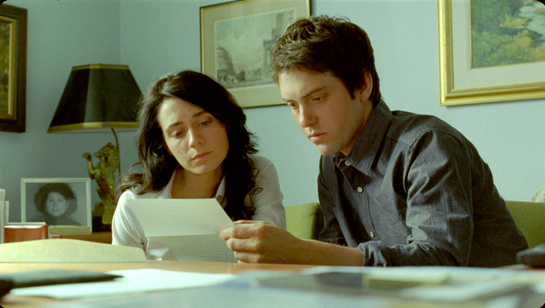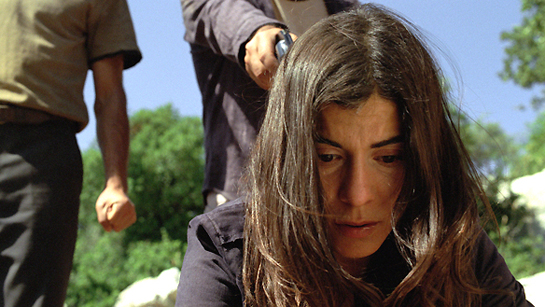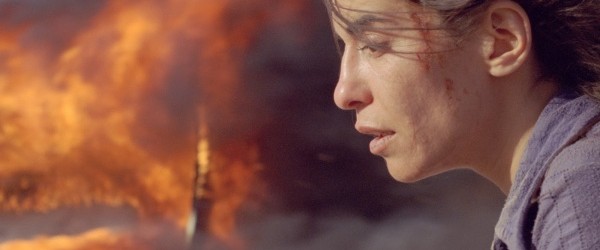In film school at the University of Regina, I was always envious learning about Quebec’s film culture, one that we Canadian Anglos simply didn’t share. In the province, a whole quarter of the films that people see in theatres are Canadian, most of which in French. In the rest of the country, it’s a whopping 1% homegrown material, our national output all but totally ignored next to Hollywood Gogolplex fare. In many cases, it’s tough to blame us: we have our
loveable losers (Fubar, Trailer Park Boys) and at times brilliant art-house vets (Egoyan, Maddin, Cronenberg), but neither camp is typically poised for box office dominance, let alone competition with the expensive American giants that the industry depends on. Bruce McDonald has certainly
fallen off his game. And our few stabs at cross-over success are either nauseating Paul Gross head-slappers, or B-grade corn that feels, as much as I hate to say, very Canadian in its cheap inadequacy. Anyone see Cooking with Stella or Score? I don’t blame you.

Oof!
Quebec has a different relationship with film because the people have avery protective nature over their culture that we Anglos simply don’t share. Sure, people all over the country get maple leaf tattoos and take pride in our marginally-better-than-American beer, but they don’t actively fight to preserve the essence of our cultural output because it is already so indistinguishable in many ways from that of the U.S. Quebecers meanwhile are in a perpetual fight to celebrate and protect that which makes them distinct, of which language and art are top priorities.

C.R.A.Z.Y., 2005
The result is a national cinema that is almost entirely removed from the other nine provinces, and one that continually sets the bar for what this country is capable of, while constantly pushing boundaries. Just the past decade alone has proven a watershed of masterstrokes, which enjoyed international acclaim: Les Invasions Barbares (The Barbarian Invasions, 2003) was a distinct portrait of the weight of the outside world on the province’s nationalist idealism. C.R.A.Z.Y. (2005) was a masterfully honest and engaging story of a gay teenager coming of age in a not-quite-liberated 60s/70s Quebec. And just in 2009, Incendies director Denis Villeneuve made poetic beauty of the horror of the 1989 Montreal Massacre with Polytechnique.

Incendies, the fourth feature from Quebecois auteur Denis Villeneuve, is gut wrenching, beautiful and dense. The story of two twins uncovering the truth about a father they thought was dead, and a brother they never knew existed, stays with the viewer long after its harrowing climax. The drama, which exists in the lies that necessarily bind families through extraordinary and horrific circumstances, needs to be seen by Canadians and the world as a reminder that this country, led by Quebec, is more than capable of producing world-class cinema. The film is largely set in Lebanon, and deals with universal issues of war, secrecy, family and death. The beauty of the film lies in unwrapping a dense and disturbing mystery along with the characters, so to give anything away would be a disservice to the film I want nothing more than to promote. This is a film that balances the personal with the political by taking us into a dark piece of history – the Lebanese civil war beginning in the mid-1970’s – through Western eyes that are putting pieces back together, and learning their own story in the process. In many ways, it is similar to the very fine Ararat, Canadian Atom Egoyan’s 2002 film which weaves several storylines uncovering truths surrounding the Armenian genocide by the Ottoman Empire after the first World War. Far from didactic, but immensely traumatic, the audience feels for these characters because their pain is not abstract, it is personal and tremendous.

The film was nominated for the Acadamy Award for Best Foreign Language film at this year’s Oscars, losing to Denmark’s In A Better World. With hope, the nomination will propel more Canadians to get out and see the incredible film, which is deserving of national attention. And with even more hope, the success of Incendies will continue to pave the way for better distribution of great Quebec films, and perhaps inspire even better work out of their English counterparts. Ideally we can create the same kind of nationally celebrated and protected product that we see today in just one province, because that kind of celebration sure produces some great work.




























[…] Incendies, another triumph for Quebec film – ZOUCH Quebec has a different relationship with film because the people have avery protective nature over their culture that we Anglos simply don't share. Sure, people all over the country get maple leaf tattoos and take pride in our […]